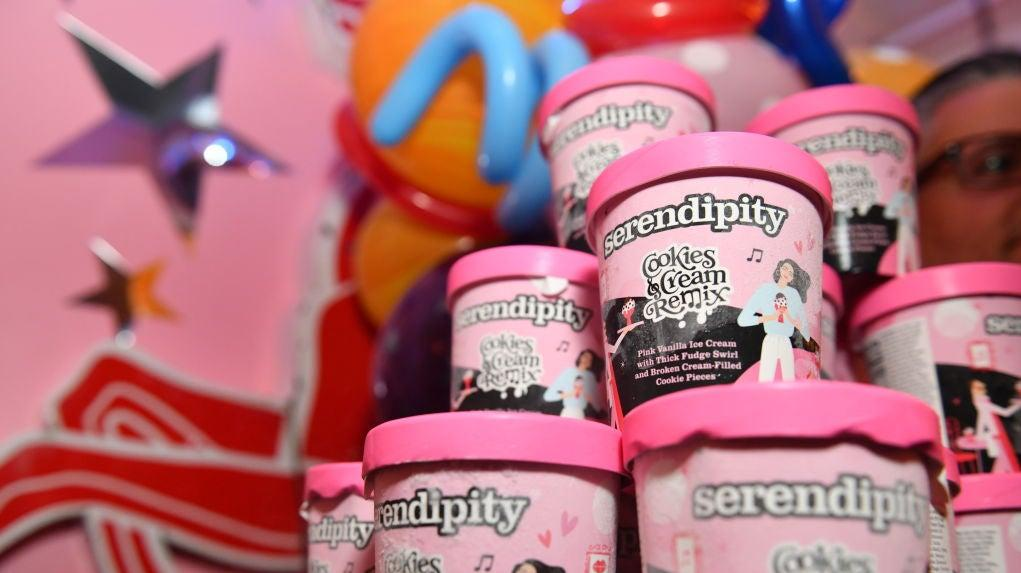How A 70-Year-Old Business Rebrands Itself For Gen Z
To stay relevant, an NYC-based ice cream brand is now targeting a younger generation.
On East 60th Street between 2nd and 3rd Avenues in New York City sits Serendipity3, a restaurant full of white tables and classic Victorian-era crown moldings, all lit by whimsically mismatched chandeliers. You can get yourself a hamburger, a sundae, or a Frrrozen Hot Chocolate, the signature menu item that has been a staple for locals, tourists, and celebrities alike since the restaurant's founding in 1954.
Serendipity Brands, a line of ice creams now sold via Amazon Fresh, Boxed.com, Goldbelly, and GoPuff, is a spinoff of the iconic NYC eatery. The brand that once catered to the likes of Andy Warhol and Marilyn Monroe (among many other glamorous stars) is now reinventing itself to reach a new, younger audience—one that's spoiled for choice.
Both the Serendipity3 and Serendipity Brands Instagram accounts are imbued with a bright and bubbly cotton-candy aesthetic that, when combined with short TikTok-style videos of young people promoting technicolor treats, fits the brand identity of a longtime company trying hard to stay relevant in a competitive business landscape.
So how do they do it? We spoke with Serendipity to find out why and how the brand has decided to cater to the younger generations, and what it means for the future of the business.
The brand famous for bringing in the famous
First and foremost, Serendipity3 is not a place for the budget-conscious. It's a brand known for extravagant desserts and classic American fare sold at Manhattan prices. Serendipity3 takes pride in holding six Guinness World Records, including the world's most expensive French fries ($200) and the most expensive dessert ($1,000). There's another development that has kept the business in the headlines: In 2020, actress and singer Selena Gomez became co-owner of Serendipity Brands.
"Selena's history with Serendipity Brands dates back to the days where she used to come into the New York City restaurant with her family," a representative for Serendipity tells The Takeout. "By kicking off this partnership, we knew that Selena could assist a brand she already knew and loved by taking it to the next level."
When companies are looking to market to a younger generation, they must consider efficiency, relatability, and novelty, and find the best way to balance the three—but a high-profile partnership with a celebrity worshipped by Gen Z certainly doesn't hurt, either.
Why Serendipity is shifting focus to Gen Z
"Serendipity is a brand built on heritage," Serendipity Brands CEO Bob Gorman recently told Forbes. "A company with a legacy behind it, and our goal is to reintroduce this footprint to the Gen Z consumer—one serendipitous moment at a time."
Roberta Katz, a senior research scholar at Stanford University's Center for Advanced Study in the Behavioral Sciences (CASBS) who recently studied the generation, has explained that Gen Z is a highly pragmatic generation and the most diverse one yet.
"For Gen Zers living in the United States and Britain (the two places we studied), the 'norm' they experienced as children was a world that operated at speed, scale and scope," Katz told Stanford News.
According to Serendipity, the desire to bring "an authentic experience like the restaurant into actual people's homes" played in the brand's decision to market toward a younger crowd.
"Our data showed the continued proliferation of home delivery services as a great opportunity to reach the Gen Z market," a representative said.
How to market ice cream to Gen Z
Gen Z is a demographic that is, in some ways, defined by its struggles with mental health. According to a McKinsey & Company's Consumer Health Insights Survey conducted in 2021, Gen Z respondents reported higher rates of anxiety and depression than any other group. And while Gen Zers were more likely to report their mental health concerns, they were also less likely to seek professional help.
"Many Gen Zers also indicated their first step in managing behavioral-health challenges was going to TikTok or Reddit for advice from other young people, following therapists on Instagram, or downloading relevant apps," the McKinsey report reads.
Selena Gomez, it turns out, is someone with experience in this arena. In 2020, Gomez founded the Rare Impact Fund, a nonprofit with a mission to "expand access to mental health services and education for young people around the world." To accomplish this goal, 1% of Serendipity's sales is donated to the Fund.
Conscious consumerism might well prove to be the hook that keeps bringing young people through the door. Assuming, of course, that they can shell out for $200 French fries, or a $20 hot chocolate, or a $30 Selena Sundae, or a $40 four-pack of ice cream pints to stock the freezer at home. Who can say no, when the Instagram Reels look so good?
